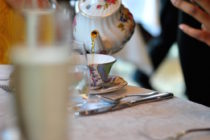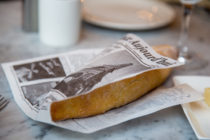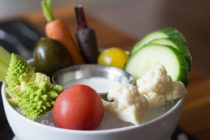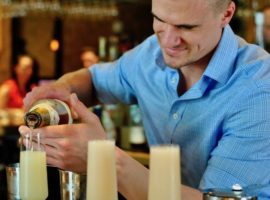“Oh my Pa-Pa, to me he was so wonderful …”
Sung with unrestrained emotion by crooner Eddie Fisher, “Oh My Pa-Pa” was released as a single in 1953.
We all enter this world dumb as mud about food. Typically a kid will stumble her way through the perplexing twists and turns of the eating maze by following breadcrumbs dropped by her mother.
One’s father, on the other hand – simply a taller, more filled-out kid himself – prefers to be led by the nose to the table …”That sure smells good, honey”… and cannot be bothered with teaching a chick where to peck for the tasty bits.
This was particularly true of family men in the 1950s. Concentrating attention on the workaday grind, most post-World War II dads had no time for kitchen folderol, no time to lend culinary guidance to their offspring. That is, unless extraordinary circumstance made tutorials of the tongue necessary.
My childhood tongue was one of those begging for assistance.
First off, my mother never dropped breadcrumbs for me or anyone else. Reigning as the frozen fish sticks queen, the idea of preparing a full-blown meal from scratch made my mother break out in a rash.
It fell to my father to blaze the food trail. Armed with trusty knife and fork, he led me into unexploded territory of gastronomy and showed me not only what a real live dead fish looked like but how to scale it, remove the guts and sauté in butter three minutes a side.
He gave me sweetbreads, which I ate because I was lured by the deceptively inaccurate “sweet.” At the innocent age of five, I swallowed my first raw oyster because he paid me two dollars to do it. On a vacation trip to Mexico City, he suggested we try the roquefort-stuffed beef tenderloin at a restaurant that had 12 tuxedoed men playing violins.
On a rustic note, when I was eight or so my father drove us west of Houston to a friend’s farm in Cat Spring where I had my first taste of milk. This was milk that had spurted straight from a cow’s udder a moment before. It was barn-temperature warm, and I don’t recall liking a liquid as much as I liked that milk until I tasted my first espresso.
 He was not a corndog man (my mother was, was a corndog woman), but would seek out authentic German sausage makers who made authentic German bratwurst, blutwurst, landjӓger in some of the more remote, bucolic regions of Texas. I went with him and learned about mustard.
He was not a corndog man (my mother was, was a corndog woman), but would seek out authentic German sausage makers who made authentic German bratwurst, blutwurst, landjӓger in some of the more remote, bucolic regions of Texas. I went with him and learned about mustard.
Into beer big time, he allowed me a sip of porter once and India pale ale twice and ruined me forever for Coca-Cola.
One time, when I was pre-teen and he was feeling generous, I got to sit on his lap and share a box of homemade white divinity fudge, coconut macaroon cakes and treacle-laced gingerbread squares sent from Arkansas by his bake-happy mother to our house where any cookies we had in the pantry were labeled Nabisco.
A hunter, my father did bring home venison, which my mother refused to even look at. She left the job of cooking to his sister who came over specifically to see to the eradication of gaminess, to season, to roast, to serve and to drink scotch neat throughout the process.
In Anaheim, California, for the opening of Disneyland in 1955, while my mother took innumerable turns on Mr. Toad’s Wild Ride, my father escorted me to the gift shop where he purchased a tin of Reese Brand fried ants. With eyes blazing a Dare you! he presented me with the dubious treat and said to eat up. I did try a bite, but ant-eating did not follow me forward.
In Chicago he suggested potatoes au gratin as a side dish for the club steak; in Jamaica he introduced me to hearts of palm; in NYC, chilled and shamrock-green asparagus vinaigrette; in New Orleans, shrimp Arnaud and eggs Benedict; and in Mobile, Alabama, chitlins, which was a palate shot that missed.
I wouldn’t love steak Diane and bananas Foster had he not had a great fondness for items cooked tableside in a chafing dish. Pleased by food theatrics, his admiration for waiters who burst into a dining room wielding flaming swords strung with kabobs was unbounded, which I learned to readily ditto.
An oldie from the 1950s, my father’s favorite restaurant dessert was the snowball – a round scoop of vanilla ice cream, coated in coconut, rolled in nuts and dipped in chocolate with a cherry on top. When in his good graces, I got one too. A frown meant no snowball, and more likely a spanking.
In Las Cruces, New Mexico, he recommended stacked green enchiladas; in Canada, wild goose; after traipsing around the Grand Canyon, he took me among the Hopi tribe where we were graciously offered bowls of corn soup made with goat meat. And once, when I was still in buckled Mary Janes, he took me to the Hollywood Brown Derby where we had Cobb salads just like the movie stars seated around us.
The first time I saw a tomato plucked directly from the vine it was plucked by his hands, and it was my father who added the salt and ice, then turned the crank on the old-fashioned wooden contraption that eventually gave us ice cream made with fresh peaches.
One peach of a guy himself, the memory of him loudly warbling some old fraternity song, while cranking out love for us so deliciously, is a fitting end to this tribute. Thanks, Dad! But really, sir, I could have done without the ants.







Follow Us